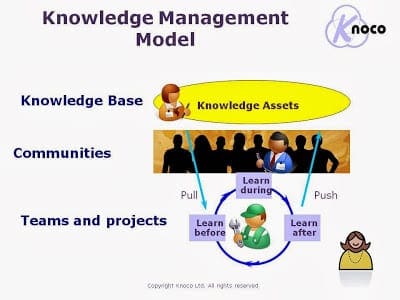
Favorite Lesson learning, though a simple idea, faces many barriers to its successful deployment. Here are 14 of them. I posted, back in 2009, a list of 100 ways in which you could wreck organisational lesson-learning. These were taken from my book, The Lessons-Learned Handbook, and represent the many ways
Read More
 Shared by Nick Milton December 3, 2018
Shared by Nick Milton December 3, 2018

Favorite The whole purpose of community is enabling people to help each other. Vkw.studiogood [CC BY-SA 4.0], from Wikimedia Commons The primary vision of Community is a group of people who help each other. This might be an Amish community raising a barn, pooling their strength and skills to help
Read More
 Shared by Nick Milton November 30, 2018
Shared by Nick Milton November 30, 2018

Favorite There is a common fallacy, that creating a SharePoint site creates a community of practice. In reality it seldom does. Photo © Oxymoron (cc-by-sa/2.0) I posted a couple of days ago about why some Communities of Practice die young. One common cause of early Community die-back is when a well-meaning person
Read More
 Shared by Nick Milton November 29, 2018
Shared by Nick Milton November 29, 2018

Favorite It’s always good to cross-check our KM programs against lists of failure and success factors. Here are two pretty comprehensive lists. Two of the most popular posts on this blog are “Top 7 tips for Knowledge Management Success” and “Top 7 reasons why Knowledge Management implementations fail.” I
Read More
 Shared by Nick Milton November 27, 2018
Shared by Nick Milton November 27, 2018

Favorite It is not uncommon for communities of practice to start with passion and intent, and to fade away and die out over a period of months. Here are 4 possible reasons why. Image from wikimedia commons I have just been reading a very interesting article entitled The Rise and
Read More
 Shared by Nick Milton November 26, 2018
Shared by Nick Milton November 26, 2018

Favorite If you hear any of these statements in the corridors around your organisation, then you need a better approach to Knowledge Management. Why do we keep having to re-learn this lesson? I’m sure I heard someone mention that to me the other day, now who was it? I am
Read More
 Shared by Nick Milton November 23, 2018
Shared by Nick Milton November 23, 2018
Favorite The video below is from the USAID-supported Vrisshi project in India, funded to scale up advances in reproductive, maternal, newborn and child health (+ adolescents as well). The video talks about a knowledge base, or collection of publications, that was created through the project for use by medical and
Read More
 Shared by Nick Milton November 22, 2018
Shared by Nick Milton November 22, 2018

Favorite Another example of quantified value delivered from KM – number 124 in a continuing series image from wikimedia commons This story comes from the same article from HBR I referenced yesterday, entitled “What managers need to know about social tools“. It shows some of the value in seeking and
Read More
 Shared by Nick Milton November 21, 2018
Shared by Nick Milton November 21, 2018

Favorite Here is a very interesting article from HBR entitled “What managers need to know about social tools” – thanks to Anshuman Rath for bringing it to my attention. It’s well worth a complete read. Image by Codynguyen1116on wikimedia commons The article by Paul Leonardi and Tsedal Neeley, from the Nov/Dec
Read More
 Shared by Nick Milton November 20, 2018
Shared by Nick Milton November 20, 2018

Favorite Last week I blogged about the simplest and best Knowledge Management model – if you missed it, follow the link. Now let’s look at the key KM roles within this model. This model is a process-based model, and is based on the flow of knowledge in and out of
Read More
 Shared by Nick Milton November 19, 2018
Shared by Nick Milton November 19, 2018
![]() Shared by Nick Milton December 3, 2018
Shared by Nick Milton December 3, 2018







